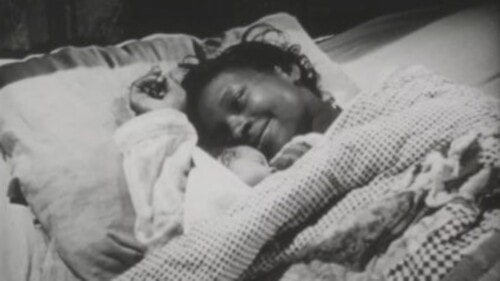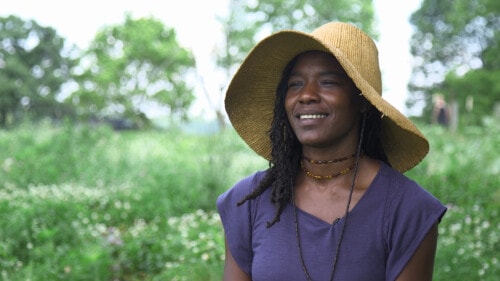Birthing Battle | Helping Hands Integrating Midwives and Doulas Can Protect Communities of Color
Published July 29th, 2020 at 12:00 PM
Teairra Cummings had a birth plan.
But during a visit to Kansas City for a family funeral, she went into labor unexpectedly. The trouble began at an area hospital. She was perfectly healthy, but doctors decided to drug test her. After she gave birth they tried to take her son away from her.
“I thought I was safe,” Cummings recalled.
Things got worse when, against hospital staff’s orders, she left the hospital with her newborn son. She drove to her parents’ home in Lee’s Summit. Her old neighbor called, telling her police were at her door asking for Cummings.
“The house was surrounded by Kansas City Police,” she said, adding that eight minutes later, Lee’s Summit Police arrived at her parents’ home. “In the midst of all that I was told I would die, that my baby would die.”
Cummings later found out that another Black mother (who she didn’t name) had a similar experience, except she complied with hospital staff’s order to leave the baby with them. That woman’s child wound up in foster care.
“This is nothing new,” Cummings said.
Hakima Tafunzi Payne agreed and said this happens “all the damn time.”
Improved Outcomes
Cummings’ traumatic birthing experience, as well as her sister’s in 2008, influenced her decision to become a doula.
Because so many women have similar trauma stories, Cummings says midwives and doulas not only support healthy births but also serve as advocates for mothers of color.
Research continues to corroborate the claims that a birth expert helps curb rising maternal and infant mortality rates.
A study across five years revealed that the integration of midwives – dubbed Higher Midwifery Integration Scoring System (MISS) – improved outcomes for mothers and babies, according to a peer-reviewed article published in the Public Library of Science. More specifically, the more midwives were involved in birthing care, the lower the rates of neonatal mortality and race-specific neonatal mortality.
“The best outcomes for mothers and babies occur in states where all types of midwives are regulated and integrated into the health care system regardless of birth setting,” the study read.
This model “mitigates the impact of any systemic racial bias,” Jennie Joseph, a British-trained midwife, told ProPublica.
However, the COVID-19 pandemic has upended that approach.
Hospitals across the country and in the Kansas City area have implemented strict guidelines and screenings. According to one Kansas City hospital, Research Medical Center, only one support person is allowed if they pass the screening. No other children or visitors are allowed.
The Centers for Disease Control and Prevention has begun to track COVID-19 cases among pregnant mothers. The most recent tally shows that there have been 12,969 cases and 35 deaths, according to data collected from January 22 through July 21 of this year.
The women who are hardest hit by the virus are Hispanic and Black women, a new study shows.
This places further pressure on the woman in labor, who must decide between having a family member there or the doula or midwife.
With the rates of mothers and babies dying in Kansas and Missouri climbing and the rise in COVID-19 cases, agencies have tried to help.
One example is the Healthy Start Grant program by the Health Resources and Services Administration. Healthy Start has operated for around 25 years and has launched 101 projects in 34 states. The program focuses care in communities with high infant and maternal mortality rates, and limited access to care and resources.
“Our needs are so very fundamental and they have to be met,” said Tracy Russell, executive director of Nurture KC, a Healthy Start grantee. Oftentimes, the mothers’ health has been overlooked pre- and post-partum, she said.
Nurture KC serves ZIP codes in the Kansas City metro on both sides of the state line at their multiple Swope Health locations in Kansas City, Kansas, and Kansas City, Missouri, as well as at Samuel H. Rodgers Health Center. On average, they help 700 people per year, 300 of whom are pregnant.
When the pandemic hit, it expanded programs to focus on what families needed most, which was food. However helpful the implementation of federal programs like Healthy Start is, Russell acknowledged that not all mothers in Kansas City are cared for equally.
“The disparities that we have just go back hundreds of years. I almost feel like people have this perception that in contemporary times this can’t be happening,” Russell said.
But it is, and COVID-19 has shone a light on how communities of color are at risk of poor care, worse if they don’t have an advocate who has been with them every step in the pregnancy. Calls for midwives are at an all-time high, according to recent reports.
Payne says that’s happening in the Kansas City area too. Some of the mothers she cares for don’t want to have their babies in a hospital setting.
“(There’s) also big uptick in ‘freebirth’ or unassisted birth because they refuse to go to the hospital and they can’t afford a midwife,” she wrote in a Facebook message.
The distrust in the hospital system is illustrated early on in pregnancy, Russell explained, but the program hopes to ease those fears.
Advocacy during COVID-19
Cummings never thought she’d become a doula.
She had a successful career in Information Technology and a comfortable life. Now that she lives in Los Angeles, one of the major hotspots of the COVID-19 pandemic, the daily increase of coronavirus cases reminds her of women in the position she was in a few years ago.
No advocate. No one to believe her. Doctors and nurses making her a suspect of alleged neglect or abuse. And a newborn child at risk of being taken by the Child Protective Services.
Such actions are protected by a federal law passed in 1974 that required health professionals to report reasonably suspected child abuse to state authorities.
“It is up to states to define abuse and the level of suspicion required for reporting,” according to the Atlantic.
This is just one example of a way in which mothers of color are discriminated against and put in a vulnerable position.
This, Cummings contends, is where midwives and doulas come in. They can help address the pattern of poor outcomes, which she calls an epidemic.
“I feel, personally, like we need that support because anything can happen,” she said. “People do things a little differently when we know people are watching. We know that there’s someone there to hold you accountable.”
Note: 2020 was dubbed the year of the midwife by the World Health Organization as research continues to show the benefits.
Catherine Hoffman reports for Kansas City PBS in cooperation with Report For America.





